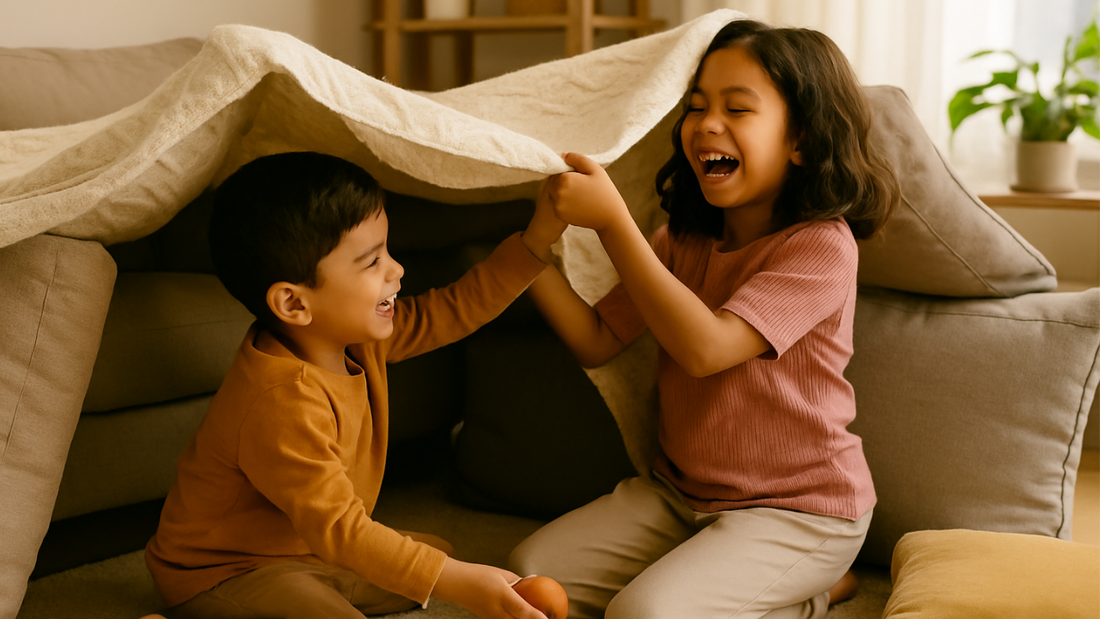
Unstructured Play Boosts Problem-Solving Skills
LiLLBUDUnstructured play is often overlooked in a world full of schedules, structured classes, and planned activities. This kind of play, where kids can explore, imagine, and make things without adult supervision, is one of the best ways to help them learn how to solve problems.
You don't need expensive toys or fancy setups for unstructured play. You can do something as simple as building with blocks, making a fort out of pillows, or turning sticks and stones into a make-believe world. The most important thing is that kids are in charge of their own play and can make their own choices and deal with problems.
What does "Unstructured Play" mean?
Unstructured play, or free play, is when kids do things without a set goal. It gives kids room to be creative, make choices, and try new things, which structured games or lessons don't. Kids can make their own rules, change them in the middle of the game, and even break them—all while using their brains. Some examples are:
- Acting like you run a "store" with toys or things from around the house
- Putting together towers with blocks and figuring out how to keep them from falling over
- Making obstacle courses in the yard
-
Making up new rules for tag or hide-and-seek
How Unstructured Play Builds Problem-Solving Skills
1. Encourages Independent Thinking
When children are given the freedom to play in any way they choose, they encounter small issues such as, "How am I going to keep this block from falling?" or "What if the ball does not pass through the tunnel that I created?" Working on these by themselves instills them with confidence in their capability to solve things.
2. Encourages creativity and adaptability
There is no script for unstructured play. Kids learn how to change their plans, find new ways to do things, and adapt when things don't go as planned. These are all important skills for solving problems in real life.
3. Improves social negotiation
When children play independently, they learn to make their own rules. They also learn how to resolve conflicts and compromise. For instance, determining who will be "it" at a new game teaches them about fairness, how to talk to others, and how to work together.
4. Fosters resilience through trial and error
In free play, failing isn't a setback; it's part of the fun. When a block tower falls, kids automatically rebuild it, trying out different ways to do it. This process of trying things out and failing helps people learn to be strong and keep going.
5. Links play to skills that are useful in real life
Unstructured play isn't just for fun; it also helps kids learn how to solve problems in real life. Kids learn how to sequence, think logically, and make decisions. These skills will help them with school projects, working with others, and even problems they will face as adults.
Benefits Beyond Problem-Solving
- Unstructured play has many benefits, but problem-solving is one of the best.
- Helps kids control their emotions by giving them a place to talk about how they feel
- Physical exploration helps improve motor skills.
- Increases creativity, which leads to new ideas and stories
- Encourages people to be independent and self-motivated
How Parents Can Encourage It
- Give open-ended materials: like blocks, art supplies, dress-up clothes, and natural things like sticks or rocks, to get their creative juices flowing.
- Don't over-schedule: Make sure there are times during the day when kids can play freely.
- Make Safe Spaces: A corner of the living room, the backyard, or even a blanket fort are all great places to do this.
- Take a Step Back: Try not to direct playtime. Let kids take charge, even if their play looks a bit “messy” or disorganized.
Letting Play Be the Teacher
Unstructured play is not just "fun time." In this natural classroom, kids learn how to think critically, be creative, negotiate, and be strong—skills that will help them for the rest of their lives. You are giving your kids the best gift of all: the ability to solve problems with confidence and joy by stepping back and letting them explore.

